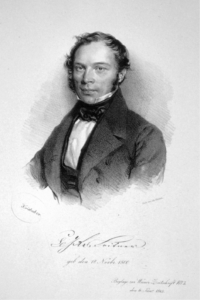Joyful departure
(Poet's title: Fröhliches Scheiden)
Set by Schubert:
D 896
[between autumn 1827 and early 1828]
Gar fröhlich kann ich scheiden,
Ich hätt’ es nicht gemeint,
Die Trennung bringt sonst Leiden.
Doch fröhlich kann ich scheiden:
Sie hat um mich geweint.
Wie trag’ ich dieß Entzücken
In stummer Brust vereint,
Es will mich fast erdrücken.
Wie trag’ ich dieß Entzücken?
Sie hat um mich geweint!
Ihr Alpen, Seen und Auen,
Du Mond, der sie bescheint,
Euch will ich mich vertrauen:
Ihr Alpen, Seen und Auen,
Sie hat um mich geweint.
Und sterb’ ich in der Fremde,
Mir dünkt nicht fürchterlich
Der Schlaf im Leichenhemde;
Denn sterb’ ich in der Fremde,
So weint sie wohl um mich.
I can depart with real joy,
Which I had not expected;
Although separation brings suffering,
I can nevertheless depart joyfully:
She cried over me.
How can I bear this ecstasy
Wrapped in my dumb breast?
It will almost crush me,
How can I bear this ecstasy?
She cried over me!
Oh mountains, lakes and meadows,
Oh moon, which shines on her,
I shall entrust myself to you:
Oh mountains, lakes and meadows!
She cried over me!
And if I die in a foreign land,
I shall not consider it frightful
To sleep in a funeral shroud;
Because, if I die in a foreign land
She will really cry over me.
All translations into English that appear on this website, unless otherwise stated, are by Malcolm Wren. You are free to use them on condition that you acknowledge Malcolm Wren as the translator and schubertsong.uk as the source. Unless otherwise stated, the comments and essays that appear after the texts and translations are by Malcolm Wren and are © Copyright.
☙
Themes and images in this text:
Chest / breast Farewell and leave taking Fields and meadows Lakes Mountains and cliffs Night and the moon Shrouds Tears and crying
We do not need to know exactly why he is leaving. It might be something prosaic, such as starting a new job elsewhere, or he might have been called up for military service. It could equally be because of something high-minded or ‘romantic’: he knows she can never be his (she has perhaps become engaged to someone else, or she is already married) so he decides that he has no choice but to leave. Whatever the scenario, there has been a grand scene of farewell and tears were shed.
Ironically, this means that he does not move on. He keeps coming back. The repeated lines in each verse take him back repeatedly to her tears. The Alpine landscape that he shared with her (the poet, Leitner, was based in Graz, Styria) remains a common bond – the moon and mountains, lakes and meadows are all now in on the secret. Even though the speaker is physically leaving the area and may die abroad, he will always return to that tearful farewell for comfort.
☙
Original Spelling Fröhliches Scheiden Gar fröhlich kann ich scheiden, Ich hätt' es nicht gemeint; Die Trennung bringt sonst Leiden, Doch fröhlich kann ich scheiden: Sie hat um mich geweint. Wie trag' ich dieß Entzücken In stummer Brust vereint? Es will mich fast erdrücken, Wie trag' ich dieß Entzücken? Sie hat um mich geweint! Ihr Alpen, See'n und Auen, Du Mond, der sie bescheint, Euch will ich mich vertrauen: Ihr Alpen, See'n und Auen! Sie hat um mich geweint. Und sterb' ich in der Fremde, Mir dünkt nicht fürchterlich Der Schlaf im Leichenhemde; Denn, sterb' ich in der Fremde, So weint sie wohl um mich.
Confirmed by Peter Rastl with Schubert’s source, Gedichte von Carl Gottfried Ritter von Leitner. Wien, gedruckt bey J. P. Sollinger. 1825, pages 154-155; with Gedichte von Karl Gottfried Ritter v. Leitner. Zweite sehr vermehrte Auflage. Hannover. Victor Lohse. 1857, page 97; and with Huldigung den Frauen. Ein neues Taschenbuch von J. F. Castelli, für das Jahr 1824. Leipzig, im Industrie-Comptoir, pages 199-200 (here as the first of Drei Liebeslieder).
Note: Schubert adds a repetition of stanza 1 at the end of the poem (with “Drum fröhlich …” instead of “Gar fröhlich …”).
To see an early edition of the text, go to page 154 here: https://download.digitale-sammlungen.de/BOOKS/download.pl?id=bsb10113663


